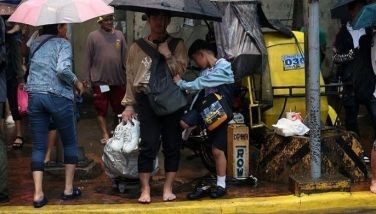‘Politics causing peso depreciation’
June 27, 2005 | 12:00am
Currency speculation and too much political noise are driving the peso under.
Philippine Chamber of Commerce and Industry chairman Donald Dee urged big businesses and banks yesterday not to engage in currency speculation that contributes to the peso’s depreciation.
The more the peso depreciates, the more costly it will be for the country to import fuel, he said.
Press Secretary Ignacio Bunye also said the depreciation of the peso will increase the cost of the Philippines’ dollar-denominated debts.
Dee said some members of the business sector are taking advantage of the tense political situation to profit from currency speculation — a practice he is discouraging: "We are asking them not engage in speculation. The fact that they have money to engage in speculation, it means that they are very rich. We are asking them to look for other ways to make profit and not in this manner that directly hits the ordinary people."
Finance Secretary Cesar Purisima and presidential consultant for investor relations Cora Guidote said part of the peso’s depreciation is caused by the "political noise" generated by detractors of the administration.
Purisima said the country’s economic fundamentals are getting stronger so the depreciation is caused by factors other than economic.
Meanwhile, Malacañang said a looming oil crisis — not the jueteng controversy or the congressional investigations into the alleged wiretapped conversations of President Arroyo — should be the paramount concern of the people.
Bunye said in an interview that the country faces an oil crisis that could "possibly (be) worse than what we ever experienced in the past."
"No amount of political squabbling and bickering will ease the impact of an oil crisis," Bunye said. "The galloping oil price is the paramount issue of the day and we must set aside our differences and focus on how we can work together to confront this."
He said the administration remains focused on finding ways to cushion the impact of the increasing oil prices, which have hit record levels. These efforts will only succeed if everyone pitches in, Bunye added.
Compounding the problem, he said, is the depreciation of the peso, which was triggered by political controversies being brought to bear against the administration.
The President called for an end to what she called "political warfare" last week to enable the country to face the surge in world oil prices.
Mrs. Arroyo labeled those who insist on destabilizing the government to exploit her current unpopularity in the face of an oil price crisis as "economic saboteurs."
She noted that the price of oil per barrel in the world market doubled in just one year, from $30 to $60 last week. She also said the country is 99-percent dependent on imported fuel.
Bunye said the government, with the Department of Energy taking the lead, is undertaking several short-term and long-term projects to reduce the country’s dependence on imported fuel including the setting up of compressed natural gas stations, the construction of an ethanol plant and exploiting the uses of other alternative sources of fuel, he said.
In the short term, Bunye said the government and the private sector have launched an energy conservation program.
However, he said energy conservation would be useless if families and individuals do not participate, even in small ways. — Paolo Romero
Philippine Chamber of Commerce and Industry chairman Donald Dee urged big businesses and banks yesterday not to engage in currency speculation that contributes to the peso’s depreciation.
The more the peso depreciates, the more costly it will be for the country to import fuel, he said.
Press Secretary Ignacio Bunye also said the depreciation of the peso will increase the cost of the Philippines’ dollar-denominated debts.
Dee said some members of the business sector are taking advantage of the tense political situation to profit from currency speculation — a practice he is discouraging: "We are asking them not engage in speculation. The fact that they have money to engage in speculation, it means that they are very rich. We are asking them to look for other ways to make profit and not in this manner that directly hits the ordinary people."
Finance Secretary Cesar Purisima and presidential consultant for investor relations Cora Guidote said part of the peso’s depreciation is caused by the "political noise" generated by detractors of the administration.
Purisima said the country’s economic fundamentals are getting stronger so the depreciation is caused by factors other than economic.
Meanwhile, Malacañang said a looming oil crisis — not the jueteng controversy or the congressional investigations into the alleged wiretapped conversations of President Arroyo — should be the paramount concern of the people.
Bunye said in an interview that the country faces an oil crisis that could "possibly (be) worse than what we ever experienced in the past."
"No amount of political squabbling and bickering will ease the impact of an oil crisis," Bunye said. "The galloping oil price is the paramount issue of the day and we must set aside our differences and focus on how we can work together to confront this."
He said the administration remains focused on finding ways to cushion the impact of the increasing oil prices, which have hit record levels. These efforts will only succeed if everyone pitches in, Bunye added.
Compounding the problem, he said, is the depreciation of the peso, which was triggered by political controversies being brought to bear against the administration.
The President called for an end to what she called "political warfare" last week to enable the country to face the surge in world oil prices.
Mrs. Arroyo labeled those who insist on destabilizing the government to exploit her current unpopularity in the face of an oil price crisis as "economic saboteurs."
She noted that the price of oil per barrel in the world market doubled in just one year, from $30 to $60 last week. She also said the country is 99-percent dependent on imported fuel.
Bunye said the government, with the Department of Energy taking the lead, is undertaking several short-term and long-term projects to reduce the country’s dependence on imported fuel including the setting up of compressed natural gas stations, the construction of an ethanol plant and exploiting the uses of other alternative sources of fuel, he said.
In the short term, Bunye said the government and the private sector have launched an energy conservation program.
However, he said energy conservation would be useless if families and individuals do not participate, even in small ways. — Paolo Romero
BrandSpace Articles
<
>
- Latest
- Trending
Trending
Latest
Trending
Latest
Recommended
November 11, 2024 - 12:00am




























